The anger on Carol West’s face looked like it had been building inside her for decades, and her voice thundered even without a microphone, easily reaching across the crowd of gays and straights that stretched across South Jennings Avenue.
 The minister of Fort Worth’s Celebration Community Church stood outside the Rainbow Lounge and talked about the harassment that gays and lesbians had suffered at the hands of police in the 1960s and ’70s. And she voiced the outrage being felt in 2009, after Fort Worth police and state liquor enforcement agents made a heavy-handed and seemingly unprovoked raid on the brand-new club that ended with 20 patrons facedown in the parking lot, numerous injuries, one man in the hospital with a serious head injury – and Fort Worth’s reputation for tolerance in tatters.
The minister of Fort Worth’s Celebration Community Church stood outside the Rainbow Lounge and talked about the harassment that gays and lesbians had suffered at the hands of police in the 1960s and ’70s. And she voiced the outrage being felt in 2009, after Fort Worth police and state liquor enforcement agents made a heavy-handed and seemingly unprovoked raid on the brand-new club that ended with 20 patrons facedown in the parking lot, numerous injuries, one man in the hospital with a serious head injury – and Fort Worth’s reputation for tolerance in tatters.
“No more!” she shouted.
As the TV news crews filmed and photographers shot and reporters scribbled, the crowd pumped their fists and shouted in unison, “No more! No more! No more!”
And just like that, Fort Worth’s traditionally quiet gay community was wide-awake and pissed off, and the city was facing its worst public relations nightmare in recent memory.
Since that raid in the wee hours of June 28 – on the 40th anniversary, almost to the minute, of the Stonewall police raid in New York City that ignited this country’s original gay rights movement – the developments have come fast and furious.
Police statements that the raid was done properly and that any injuries were the result of officers being assaulted quickly melted in the face of eyewitness reports to the contrary. Fort Worth Police Chief Jeff Halstead has temporarily halted his department’s cooperation with the Texas Alcoholic Beverage Commission and pointedly noted that TABC agents, not police, had taken Chad Gibson, the most seriously injured man, into custody. TABC agents have been taken out of the field and assigned to desk duty pending reviews of their actions. The New York Times, the Los Angeles Times, and other newspapers across the country have published major stories on the raid. The Dallas gay establishment has come west to support the gay community here in marches and protests. Three different sets of public officials and community leaders, including the mayor, have called for independent investigations of what happened that night. The airwaves and cyberspace are full of those condemning Fort Worth as some backward, intolerant, jackbooted town. Gay activists across the county are calling this Stonewall II.
“It’s like raiding a black bar on the anniversary of emancipation,” said Rainbow patron Tony Thompson.
But what did happen that night? And just as important, why?
City and state officials have yet to release police and TABC reports on the raid – the city now requires reporters to file open-records requests to get police reports, which once were available just by walking up to a police station window.
However, evidence from eyewitnesses – including an accountant who took detailed notes for the entire hour that police were at the Rainbow – tells the same consistent story: Even though the club had no record of presenting problems for law enforcement or the neighborhood, police and TABC agents arrived in force that night, seemingly ready to make multiple arrests before the first officer walked through the door. The raid was conducted a mile outside the lines of what usually happens in such instances. Multiple witnesses said officers were apparently looking for a fight, arresting people because of mild comments, without even a pretense of trying to find out if they were drunk. And several bar patrons were subjected to brutality far beyond the level of force needed to make an arrest, warranted or not.
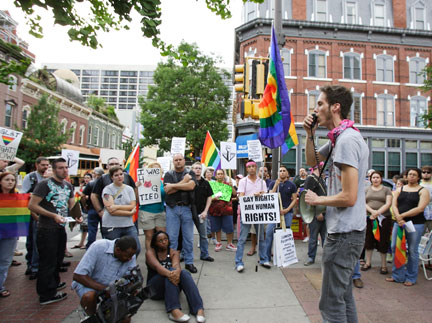 Operators and patrons of gay clubs in Fort Worth have had their differences with police and TABC agents in recent years, no doubt – especially on the Near South Side, where most of Fort Worth’s thin ranks of gay clubs have been located in recent decades. But until the night of June 28, those problems had more to do with subtle pressure from police and the city bureaucracy, not with violence or physical abuse. And the same team that showed up at the Rainbow had also raided two other Southside bars earlier the same night, making numerous arrests but reportedly doing their work professionally and without incident.
Operators and patrons of gay clubs in Fort Worth have had their differences with police and TABC agents in recent years, no doubt – especially on the Near South Side, where most of Fort Worth’s thin ranks of gay clubs have been located in recent decades. But until the night of June 28, those problems had more to do with subtle pressure from police and the city bureaucracy, not with violence or physical abuse. And the same team that showed up at the Rainbow had also raided two other Southside bars earlier the same night, making numerous arrests but reportedly doing their work professionally and without incident.
What’s more, Police Sgt. Richard Morris, who was allegedly in charge of the Rainbow operation, has a sterling reputation, both for efficiency and compassion. He’s a 30-year veteran, a retired minister who does volunteer work with the homeless.
On the other hand, the raid appears to have broken TABC’s own recently instituted policies about investigating bars allegedly selling to intoxicated patrons. A few weeks before the Rainbow Lounge raid, the TABC supposedly had suspended most undercover operations because of an allegation of improper conduct made against an agent. Such investigations in the future, an agency spokeswoman told an Austin newspaper, would be “uncommon and targeted toward establishments with a clear record of proven infractions” – which doesn’t seem to have been the case at the Rainbow.
Investigations may eventually explain a lot about what happened that night, and why TABC agents and police were even there. But one thing is already clear: There’s no going back. The relationship between Fort Worth and its gay community, which in recent years had been marked by quiet but steady progress, has changed, perhaps irrevocably.
The Rainbow Lounge had been open only a week when police and Texas Alcoholic Beverage Commission officers showed up after midnight on June 28 and waded into the large crowd to look for drunken patrons. The club is trendy, with plenty of cold air conditioning, a large wood-floored dance area, spinning laser lights, pool tables, video games, and caged platforms where men and women dance in their underwear. (No, not bathing suits or dancewear – underwear.) A VIP room boasts plush sofas and coffee tables, and there’s a patio out back.
The building on South Jennings Avenue has been home to other gay bars in the past. None were as high-end as the Rainbow.
Tom Anable, 55, is the Fort Worth certified public accountant who oversees the club’s books. He was there that night checking out the software used in the cash registers and showing bartenders how to tally up at night’s end. He arrived at about 11:30 p.m. and was behind the VIP bar when the first TABC agents came in shortly before 1 a.m. and began questioning patrons.
“They did not go behind the bar and ask to look at any permits” as would be the norm, he said. “They did not ask any of the bartenders, the owner, or manager any questions. The security guard at the front door told me he asked the agents and police why they were there, and they told him, ‘Make yourself scarce.’ “
Anable said he sensed something was awry and immediately began writing down what he saw.
“I was taking notes as they came in, and marking down times and what was happening,” he said. “Within two minutes after they came in, they had already put wrist ties on two people and taken them out of the bar.”
Anable counted 21 people who were led outside, including nine who were pulled from the dance floor.
“They would come in waves of three, with one TABC agent and two police officers, and some of those they took out, they never even spoke to,” Anable said. “They would walk up behind someone, tap them on the back, and tell them they were under arrest for public intoxication.”
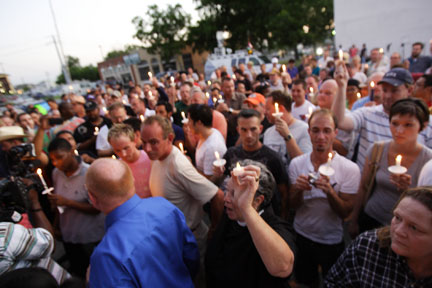 Other witnesses described agents and police who seemed angry when they walked in the door, spoiling for trouble and arresting anyone who gave answers they didn’t like or who didn’t seem properly submissive. The Rainbow’s layout is open, and patrons had mostly unobstructed views of the action.
Other witnesses described agents and police who seemed angry when they walked in the door, spoiling for trouble and arresting anyone who gave answers they didn’t like or who didn’t seem properly submissive. The Rainbow’s layout is open, and patrons had mostly unobstructed views of the action.
Police spokesmen said after the raid that they had entered a bar crowded with intoxicated people, that officers were dry-humped and groped, and that they reacted properly.
Eyewitnesses, including former Fort Worth Star-Telegram reporter Todd Camp, said they saw no groin-grabbing or other physical improprieties directed at the officers. Customers instead were apprehensive at the sight of burly cops wearing uniforms, flak jackets, and firearms and gave them as wide a berth as they could, the witnesses said.
Eric Ensminger, 36, a nurse who works on a contract basis at local hospitals, said he was on the back patio when a police officer confronted him.
“He was shining a flashlight in my face and demanding to know how many drinks I had had, when one young guy at another table whispered, ‘Why are they so mad?’ ” Ensminger said. The young man’s friend answered, “They’re mad because they can’t find any underage drinkers.”
The officer spun around and demanded to know who’d made the remark, Ensminger recalled. “The one guy admitted he did, and the next thing you know, both guys had their wrists tied behind their back and were being led out the door,” he said. “It was just bizarre and very scary.”
Anable said a police officer approached a thin Hispanic man playing pool and asked him how much alcohol he had consumed. The young man answered that he was drinking water.
“The next thing I know, they are smashing his face into the pool table, putting the wrist ties on him, and then they pulled him out of the bar with his feet dragging,” Anable said.
The 21st – and last – person taken out in handcuffs was also the most seriously injured. Chad Gibson, 26, of Euless was standing near the VIP section when a TABC officer approached him in an agitated way, according to numerous witnesses. Anable noted the time – 1:45 a.m. – and wrote down that Gibson was drinking a bottle of water.
The agent asked Gibson how much alcohol he’d had that evening. Gibson reportedly said something like, “Why are you asking?” and the agent grabbed him in a headlock. Three Fort Worth officers and another TABC agent rushed over.
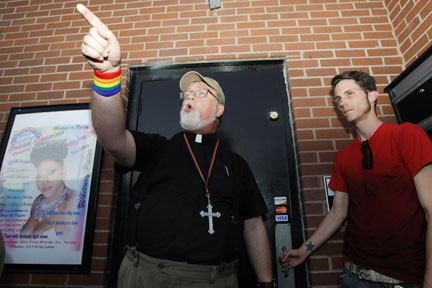 Wayne Olson, 35, was making his way to the bathroom when he saw a TABC agent holding Gibson down on the brick floor.
Wayne Olson, 35, was making his way to the bathroom when he saw a TABC agent holding Gibson down on the brick floor.
“Someone from the VIP lounge shouted, ‘Thank you for your service’ to the officers, but it wasn’t a compliment,” Olson recalled. “It was said with sarcasm, and that seemed to set the officers off.”
A police officer shoved him into the bathroom and told him to get out of that hallway, Olson said. A bartender was inside the bathroom as well, and both feared the police would come in and claim the two were having sex and arrest them for public lewdness. So Olson pushed his way out, and what he saw shocked him.
“They had [Gibson] on the floor on his stomach, his hands were tied behind his back, with one officer on top of him and another sitting on his back,” and a third officer had a knee on Gibson’s neck, Olson said. “They were pulling his head back by his hair, and then they smashed his head into the floor and wall several times. I was so scared, I got out of there as soon as I could.”
Both Olson and Anable said they never saw Gibson grab an officer’s crotch, as police later claimed.
“Five officers are on him, his hands are tied, and they are claiming he is grabbing their crotch during all this,” Anable said. “Absolute bullshit.”
Anable and others said that, by the time officers approached Gibson, they’d been in the bar for 45 minutes and arrested many customers, and the serious tone of the raid was clear.
“Oh yeah, guns and badges and seeing people being dragged out of a bar, and these police officers are saying someone would grab an officer’s crotch,” Anable said. “That press conference where the Fort Worth police chief said there was all this crotch-grabbing going on is going is to cost this city more than it will ever know. Fort Worth is now perceived around the world as a city where the cops assault gays in a bar and explain that the reason they did it was because these young men were sexually assaulting them.”
Gibson was led outside before 2 a.m., but no ambulance arrived until about 2:30, according to Anable. Gibson suffered a serious brain contusion and still has a blood clot behind his right eye. After eight days he was released from the hospital and is now recuperating at home, but his sister, Kristy Morgan, said he still reports suffering from severe headaches.
He wasn’t the only person injured in the raid. According to witnesses, including Camp, three other men suffered injuries: a broken thumb, a cracked rib, and an injured shoulder. The Weekly was unable to contact the injured men, and Gibson did not return phone calls for an interview.
After an 18-year writing career with the Star-Telegram, Camp took a buyout in 2008 from the struggling newspaper and began working at a credit union. He’s also artistic director at Q Cinema, a local gay and lesbian film festival. On the night of the raid, he was celebrating his birthday at the Rainbow after spending the afternoon screening documentaries about the 1969 Stonewall riots.
“Most straight people don’t know what a big day that was for the gay and lesbian community, but most people I talked to in the bar were very aware,” he said. Camp and others in the lounge that night said they don’t believe the agents and police were aware of the significance of the date.
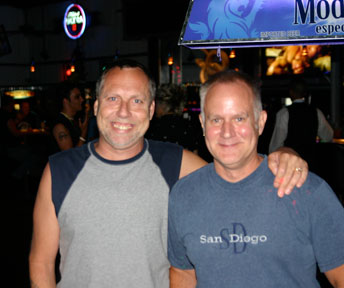 Camp, 43, was standing at the VIP room bar behind another customer when an agent moved in, pushed him out of the way, handcuffed the other customer, and dragged him outside.
Camp, 43, was standing at the VIP room bar behind another customer when an agent moved in, pushed him out of the way, handcuffed the other customer, and dragged him outside.
“They didn’t ask this guy anything, just said he was under arrest,” Camp said. “It was just so strange because I had never seen police acting that way here in Fort Worth in gay bars.”
Camp said he has witnessed a half-dozen TABC inspections in local gay bars over the years, mostly at the old Hot Shots club that operated until about three years ago in the same location as the Rainbow. “It is something gays expect to live with,” he said. But this one was different.
In other raids, Camp said, the agents and police would come in and ask the bartenders to get out from behind the bar and then look at the permits and the liquor bottles. Then they would turn up the lights, turn down the music, and check to see if any customers were intoxicated. The TABC agents and police “were always polite and friendly,” Camp said.
This time, however, the lights remained low and the music loud. “They didn’t do any inspecting and just seemed to want to arrest as many as possible,” Camp said. “The fact that they have six squad cars as well as at least one paddy wagon makes me think they had made up their minds to arrest people before they ever came through that door.”
The TABC can inspect any bar or retail establishment at any time, including within a week of a bar’s opening. But it appears that in the action at the Rainbow, TABC agents weren’t following their agency’s own protocols regarding investigations of public drunkenness – rules that were revised recently because of concerns about other types of abuses by agents.
According to the agency’s policy and procedure guidelines, the most common reasons for inspections are a history of criminal violations, a complaint from another agency alleging unlawful conduct, or direct observation of suspicious activity or unlawful behavior.
Prior to 2006, TABC did many undercover operations under the heading of “Sales to Intoxicated Persons” or SIPs. But that year, after TABC agents arrested a woman in an Irving hotel bar even though she was staying at the hotel, changes ensued. The Irving sting made national news, and state legislators thought it heavy-handed.
The TABC temporarily shut down the program. It was later revived, but the agency staged SIP raids much less frequently than they had before the Irving incident.
On June 11, just three weeks prior to the Rainbow raid, a TABC agent was arrested on allegations of “inappropriate conduct” with a teenage girl who assisted in a sting operation against retailers suspected of selling alcohol to minors. At that time, TABC Administrator Alan Steen said the agency was suspending undercover operations pending a review of the incident.
TABC spokeswoman Carolyn Beck told the Austin American-Statesman that future undercover investigations would be “uncommon and targeted toward establishments with a clear record of proven infractions.” Though the Rainbow raid was not an undercover operation, it did come at a time when the TABC was re-evaluating its public intoxication arrest policy.
The Rainbow apparently had no history of criminal violations or “proven infractions,” and officials have not revealed any complaints they received about unlawful conduct. Randy Norman, the bar’s general manager, said no arrests had occurred at the bar in the seven days it had been open prior to the raid.
(At press time, the city had not responded to Fort Worth Weekly‘s June 30 public information request seeking police records involving arrests at the Rainbow Lounge. By law, the city can take up to 10 business days to respond, although the law also says government agencies should respond as quickly as possible.)
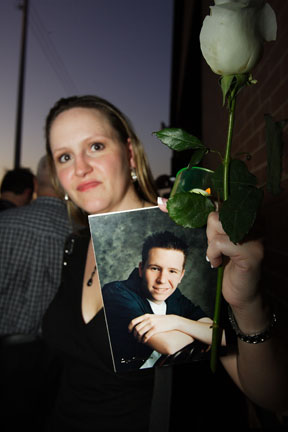 Ensminger, the nurse who was present during the raid, said Fort Worth police officers were at the club every night during the initial week. “Sometimes [police] would just walk into the club, look around, and leave,” he said.
Ensminger, the nurse who was present during the raid, said Fort Worth police officers were at the club every night during the initial week. “Sometimes [police] would just walk into the club, look around, and leave,” he said.
During the raid, according to the Dallas Voice, a customer asked a Fort Worth police officer why they were there and was told that a disgruntled employee had accused the club of overserving customers. Neither Fort Worth police nor TABC officials will say which agency requested the raid. Chief Halstead announced on July 2 that he was suspending joint operations with the state agency.
One of the problems in trying to determine whether the TABC acts reasonably is the fuzzy criteria for what constitutes public intoxication under Texas law. According to the Texas Penal Code, the offense is committed when a person appears in a public place “while intoxicated to the degree that the person may endanger the person or another.” However, law enforcement officers use their own judgment about whether that level of drunkenness has been reached; the law does not require them to test breath or blood for alcohol content.
“From all the reports I have seen, the arrests made at the Rainbow Lounge did not even come close to satsfying the requirement that these people were a danger to themselves or others,” said Rob Wiley, a Dallas attorney who has worked on public intoxication cases. “If there was a fight in the bar, and the people starting it or engaging in it were intoxicated, that is an appropriate interpretation of the law, and those people should be arrested. But these people were dancing and sitting on the patio having a few drinks. It doesn’t seem logical.”
While Fort Worth police and TABC officers have hammered clubs citywide that have a history of problems and have been accused of hassling bars that cater to Latinos and African-Americans, even gay bar patrons and operators question whether their clubs have been routinely or unfairly targeted in recent years.
Some observers believe that more intense scrutiny directed at gay clubs may in fact be a geographical accident, part of an effort by police to control the number of bars of all kinds in the hotly redeveloping Near South Side neighborhood.
Just prior to hitting the Rainbow, the same team of police and TABC agents made similar inspections at nearby Cowboy Palace and Rosedale Lounge, two clubs that share a parking lot and cater to straight Latinos. A security guard on duty that night said police showed up looking for underage drinkers and drunken customers, arrested a handful of people for public intoxication, and then went on their way. Club employees said the officers were professional and respectful.
Police come around regularly, every few months, to inspect those bars but seldom throw their weight around or act like bullies, said Jesus Lopez, who works security at Cowboy Palace and witnessed the June 28 visit.
“I never see them [act] with anger, and I’ve been here a while,” he said.
However, a longtime vice officer, who asked not to be identified, said Latino club owners and patrons rarely complain about police or TABC agents, regardless of the treatment they receive. He also expressed skepticism that a disgruntled employee’s complaint prompted the Rainbow raid.
“A disgruntled employee after a week?” he said.
Just east of the two Latino clubs is the gay nightclub Copa Cabana. Police didn’t hit the Copa that night. Longtime employee Carlos Lara, whose brother owns the club, said he could recall only one or two inspections at Copa since it opened three years ago, and officers, he said, “have never been unruly, never rude.”
While the Fort Worth gay community is scattered throughout the city’s neighborhoods, the gay bars have mostly congregated in the Near South Side, largely because that was a downtrodden part of town and a place where, in years past, gays could fly below the radar.
In the last decade, however, the Near South Side has been a target of economic development, part of Fort Worth’s “urban village” program. And a part of that program, allegedly backed by the influential hospitals in the area and potential developers with power and money, was to rid that part of town of its collection of seedy bars.
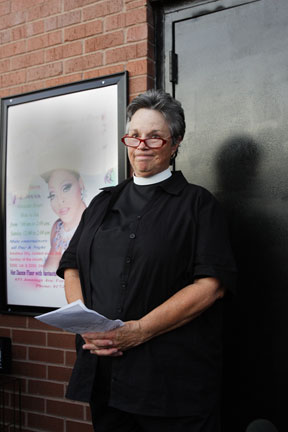 Police haven’t targeted just gay bars – they’ve targeted bars in general, said attorney Frank Thompson, whose office is on South Jennings. He’s represented bar owners in the past as they’ve felt the squeeze from police.
Police haven’t targeted just gay bars – they’ve targeted bars in general, said attorney Frank Thompson, whose office is on South Jennings. He’s represented bar owners in the past as they’ve felt the squeeze from police.
“About two or three years ago I had to call [police] because they were harassing the bars in this part of town because at that time the rumor was the Basses [Fort Worth’s prominent Bass family] were trying to buy up this property, and they were attempting to get all these places closed down,” he said.
The pressure on the bars eased off once interest from developers waned because of the current economic crunch, he said.
Police also keep tabs on new clubs, which might explain why they made their presence felt so quickly at the Rainbow.
“The city had a plan to clean up that area, and we noticed that most of the time when a new club opened, it attracted a bad element that we didn’t want down there,” said a former city official who didn’t want his name used. “But I never got the feeling that police were ever just targeting gay clubs. They just mainly kept a close eye on new clubs and made sure these clubs weren’t adding to problems.”
Tactics used by police to make Southside clubs uncomfortable were fairly standard, according to a former manager of one gay club in the neighborhood, who asked not to be identified.
“They would put up ‘no parking’ signs on the streets nearby and tow cars of people who didn’t park in the right places,” he said. “They would have their patrol cars parked nearby and pull over bar patrons after they left and drove off.”
“I never felt they were targeting gay bars, but it may be one of the reasons Fort Worth does have so few,” the former bar manager said. “The first year we were open was real tough, because the police were there all the time. But after they saw we were not a problem, they left us alone.”
This tactic – some call it harassment – is reportedly common at predominantly Hispanic bars in the district.
Ensminger said that in the Rainbow’s week of operation before the raid, a cop car was usually parked a block down the street and officers would randomly walk into the club. “Like it or not, that’s how things are, and we have gotten used to it,” he said.
“That why that raid was so hard to understand,” he said. “It was nothing like I have ever seen from the Fort Worth police. It was an hour of terror, and I am still upset about it.”
The gay community in Fort Worth has always been on the quiet side, in part because of its proximity to Dallas. Big D has a gay neighborhood in the Oak Lawn area, a gay newspaper (Dallas Voice), and a few dozen gay clubs. Fort Worth has no defined gay part of town, no paper, and only about a half-dozen bars.
As the Rev. Carol West has recounted, in the old days police would arrest same-sex couples for just sitting and talking together in the gay clubs. She also said police would take down license plates numbers of car parked nearby and have them published in the newspaper.
“That’s why those old enough to remember what it was like 40 years ago are shocked by this,” West said. “We have made great strides as a community, and for this to happen shows all of us how much further we have to go.”
So as members of the Fort Worth gay community walked out of the closet in recent decades, many of them tended to socialize in Dallas. As one Fort Worth gay man put it, “It’s sort of like the Las Vegas TV commercial, where they say ‘What happens in Vegas stays in Vegas.’ For us, what happens in Dallas stays in Dallas.”
Rafael McDonnell is a communications manager at Resource Center Dallas, the nonprofit organization that operates a gay community center in Dallas and offers services such as HIV testing and counseling. It’s one of the largest organizations of its kind in the country.
McDonnell was born in Fort Worth and still lives here. Resource Center Dallas helps out occasionally with Fort Worth events, but he doesn’t think his hometown needs to look to its flashier neighbor as a role model. The two cities have different styles.
“Fort Worth has a number of great community organizations, but it’s not a ‘shout it from the rooftops’ kind of city,” he said. “People work more behind the scenes. I remember when community members worked with the late Chuck Silcox – a very conservative city council member – to get an anti-discrimination ordinance into the city charter. We did that before Dallas.”
Moreover, when Resource Center Dallas recently held a community jobs fair, Fort Worth city officials came looking for recruits. For the most part, city officials want to reach out to gay and lesbian citizens, McDonnell said.
City hall is largely friendly to gays these days because of what some people call “the gay factor,” said the former Fort Worth official who had asked not to be named. “The gay community fixes up neighborhoods and tends to have more disposable income, and economic growth follows them,” he said. “I knew no one with the city staff or council or the police who thought that having gays in a neighborhood was a bad thing. In fact, they saw it as quite the opposite.”
The overall result has been that, up to now, the gay community, like other minority groups, generally has gone along with the “Fort Worth way,” a term that roughly translates to “Let’s all try to get along without making a fuss like they do in Dallas.”
But that ship has sailed.
“If the TABC and FWPD are desiring to express goodwill in this, let them agree wholeheartedly to an impartial, independent investigation,” said the Rev. Stephen Sprinkle, an openly gay ordained minister and professor at Texas Christian University’s Brite Divinity School. “If you send the devil to hell for a trial, you are assured what kind of verdict the devil will get.”
Not everybody’s buying the police chief’s sudden benevolence, his promises of sensitivity training, a police liaison to the gay community, and encouraging of witnesses to come forward. He’s sadly mistaken, activists say, if he thinks he can beat out the flames of revolt with a few token olive branches. This time, they say, the gay community and their straight supporters aren’t letting police off the hook.
Police didn’t help themselves in their initial explanations of what happened.
“You’re touched and advanced in certain ways by people inside the bar; that’s offensive,” Halstead said. “I’m happy with the restraint used when they were contacted like that.”
Many residents doubted that explanation.
“For police to make that claim is unbelievable and shows that these law enforcement people have homophobic tendencies,” Sprinkle said. “We have no idea what was on [the police and TABC’s] minds that night, but what they got in the blowback from that raid was much more than they bargained for.”
More than 9,000 people thus far have signed up as members of a Facebook page, set up by Camp, about the raid.
Two Fort Worth legislators, State Sen. Wendy Davis and Rep. Lon Burnam have called for independent investigations by a board of private citizens. Nine other local political leaders and activists signed a petition calling for the same. Mayor Mike Moncrief has requested that federal prosecutors review the results of internal investigations.
The main change wrought thus far in the Fort Worth gay community is that its leaders are working more closely with the gay leadership in Dallas and nationally. The Dallas-based Queer LiberAction, a national gay advocacy group, has been sponsoring the vigils and protests in Fort Worth. And they are making some strong demands prior to a July 12 rally planned at the Tarrant County courthouse.
If Moncrief and Halstead don’t apologize prior to the rally, Queer LiberAction’s web site said, the “tone of the rally will be to adequately express the indignation from our community regarding the city of Fort Worth’s less than aggressive response to homophobia and police brutality.”
The group is also demanding serious discipline for the arresting officers and the firing of the officers involved in Gibson’s arrest.
The Tarrant County Stonewall Democrats, a local gay political action committee, is raising money for Gibson’s medical bills and working with its national organization to encourage those who were at the club that night to come forward as witnesses for the investigations and to receive free legal advice.
“We refuse to be second-class anymore, and we will not permit this kind of harassment any longer,” Sprinkle said. “We will stand up for our own.”
Staff writer Jimmy Fowler contributed to this story.











